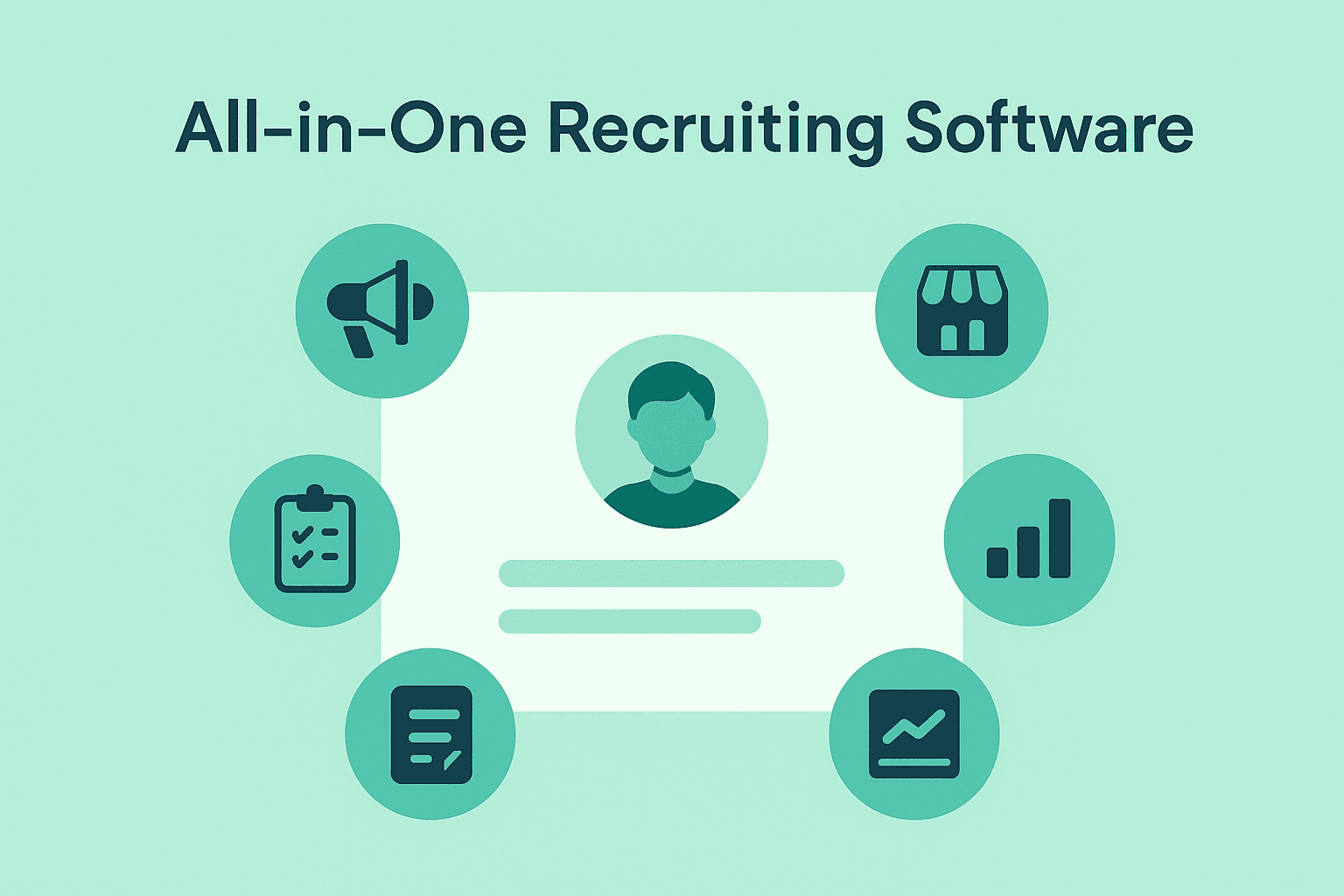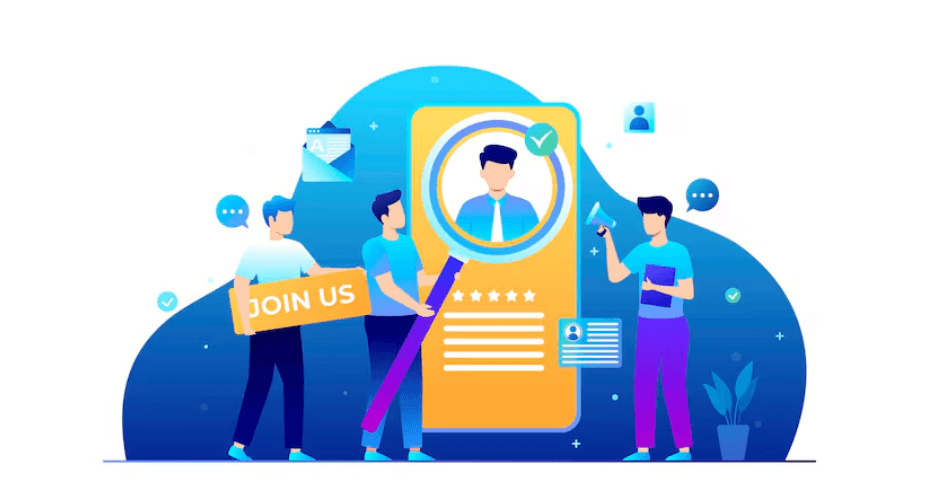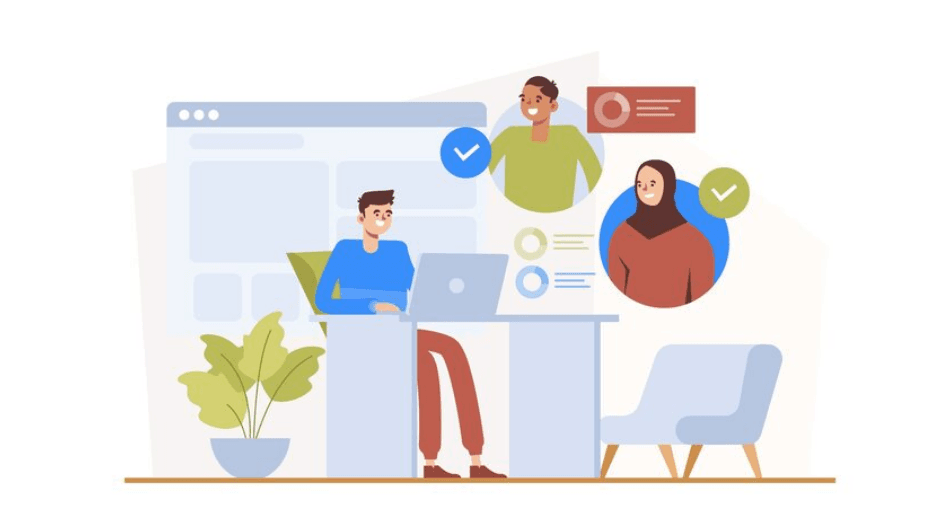What Does All-in-One Recruiting Software Really Mean?
Updated : 5 months ago
 If you’ve been anywhere involved in hiring lately, you’ve probably heard recruiters tossing around the term “all-in-one recruiting software.” It’s actually known as the ultimate magic wand for talent acquisition.
If you’ve been anywhere involved in hiring lately, you’ve probably heard recruiters tossing around the term “all-in-one recruiting software.” It’s actually known as the ultimate magic wand for talent acquisition.
Don’t you think that it sounds impressive—one platform to -
- post jobs,
- track candidates, and
- send offer letters.
But here’s the thing: recruitment technology is crowded with a lot of tools claiming to be “all-in-one.”
Some are genuinely powerful end-to-end solutions, while others just carry features stitched together under a flashy label. And if you’re a recruiter or HR leader betting on the wrong one, you could end up with a costly, clunky system. It can slow you down instead of speeding you up.
Let’s learn what “all-in-one” really means in recruiting software, why it’s such a big deal in 2025.
What Is Meant By “All-in-One” in Recruiting?
 When recruiters talk about an all-in-one recruitment platform, they’re referring to a single, unified system, like uRecruits. It can handle every step of the hiring process—from the moment you post a job to the day your new hire walks through the door.
When recruiters talk about an all-in-one recruitment platform, they’re referring to a single, unified system, like uRecruits. It can handle every step of the hiring process—from the moment you post a job to the day your new hire walks through the door.
Think of it as your recruitment mission control. Instead of handling five different tools for sourcing, tracking, communicating, and onboarding, everything happens in one place.
Applicant Tracking System (ATS)
The ATS is the engine room of any recruiting software. It -
- manages job postings on different boards,
- automatically checks resumes,
- tracks where each candidate stands,
- schedules interviews,
- Force communication, and
- generates analytics to measure your hiring performance.
Modern ATS tools even use AI to rank and match candidates. It helps you focus on the most promising profiles first.
Recruitment CRM (Candidate Relationship Management)
ATS is great for active candidates. However, the CRM is built for cultivating relationships with potential hires. It -
- stores contact details,
- keeps track of your interactions, and
- automates personalized messages.
It allows you to keep talent pipelined full. Further, it is crucial for long-term hiring strategies where talent engagement is just as important as filling today’s vacancies.
Additional Integrated Features
If you want get an “all-in-one”, many platforms like uRecruits comes with extra features, such as:
- Assessment tools - It can check candidate skills and if they can fit.
- Video interviewing - Help save time and expand your reach beyond geographic limits.
- Scheduling automation - Eliminate any back-and-forth of setting up interviews.
- Career site builders - Create branded, mobile-friendly job pages without any special designing skills.
You can say that an all-in-one recruiting platform isn’t just about tracking candidates. It’s about arranging every tool you need to attract, engage, evaluate, and hire talent.
Why Platforms Put Everything in One Place?

Recruiters today have a lot when it comes to their plus point—
- finding the right candidates,
- keeping track of received applications,
- scheduling interviews, and
- making quick decisions.
When you do everything with separate tools, it can create a lot of mess and consume unnecessary time. That’s why many companies now use all-in-one recruiting platforms. It brings everything together in one system. Here’s why it makes such a difference:
a) Work Quickly without Any Hurdles
You are wasting your time, if you’re using different apps for -
- posting jobs,
- checking resumes,
- sending emails, and
- scheduling interviews.
An all-in-one system puts all these tasks in one dashboard. It allows you to:
- Post jobs,
- Track candidates
- Send offers
- Move smoothly from one step to the next without any clicks
- Train new team members faster because they only need to learn one tool.
It means less confusion, fewer mistakes, and more time spent finding the right people.
b) All Your Data in One Place
When you use different tools, your information ends up scattered everywhere. What happens is candidate details show up in one app. However, when you need interview notes, you need to check another and emails somewhere else.
With an all-in-one platform, everything is stored together:
- Candidate profiles and resumes
- Interview feedback and notes
- All messages and emails
Having everything in one spot makes it easier to see the full picture. You can spot problems early and make smarter hiring decisions.
c) Save Money
Paying for multiple tools means more bills, more logins, and juggling with more customer support. An all-in-one platform means:
- One subscription
- One vendor to contact
- Easier budgeting and planning
It’s simpler, cheaper, and frees you up to focus on hiring. You don’t have to worry about managing software.
When you put all your recruiting tools together it isn't just about convenience. It makes hiring faster, smarter, and more cost-effective.
Where AI Fits In ? And What You Should Watch Out For?
Artificial Intelligence is now a big part of modern recruiting software. It’s built into different parts of the platform that makes hiring faster and smarter.
For example, AI can:
- Match candidates to jobs by analyzing their skills and experience
- Screen resumes automatically
- You can spend less time reading every application
- Remember language through semantic parsing
- Spot relevant experience even if it’s worded differently
These AI features can save hours of manual work. It helps you focus on the most promising candidates.
But here’s the catch—AI isn’t perfect. If it’s not designed and monitored carefully, it can make mistakes or even carry hidden biases.
For example, an AI tool might unintentionally favor certain backgrounds or demographics if it’s trained on biased historical data. That’s why human oversight is still crucial.
AI can be a helpful assistant, but do not make it a final decision-maker.
What Are Some Of The Best Practices for Using an All-in-One Recruiting Platform?
When you jump into a new recruiting system it can feel overwhelming. However, if you plan it right, you’ll get maximum value with very little effort. Here are some simple steps you can follow:
1. Know What You Really Need
Start by making a list of features you really need.
- Do you need strong candidate sourcing?
- Automated interview scheduling?
- Detailed reporting?
When you know what you really mean, it can help you pick a platform that truly fits your hiring style.
2. Test the User Experience
If your team doesn't know how to use it, even the most powerful tool is useless. Take some time to see how intuitive the platform is -
- is it easy to post a job,
- track candidates, and
- collaborate?
If your recruiters enjoy using it, adoption will be much smoother.
3. Start Small, Then Expand
You don’t have to give access to everyone on day one. First, test it with a smaller team or a few job openings first.
It lets you gather feedback, fix issues, and fine-tune your process before you launch it completely.
4. Keep Your Data Mobile
Your recruiting data is valuable. So, don’t let it get locked into one system. Make sure the platform allows easy data export. It allows you to move it if you ever switch tools in the future.
5. Watch the AI Closely
If your platform uses AI for screening or ranking candidates, keep an eye out for bias.
Make sure your recruitment team double-checks important hiring decisions and regularly reviews how the AI is working. AI should assist you—not replace your judgment.
Finally…
All-in-one recruiting software like uRecruits is a smarter way to manage the entire hiring process from one place. When you use a tool that can do a lot, it removes unnecessary chaos of juggling multiple systems.
The result? There is faster hiring, cleaner data, simpler workflows, and a better experience.
However, no matter what, the key is choosing the right fit. Not every “all-in-one” platform is truly comprehensive. Further, not every business needs every feature.
So, before you choose any, carefully check what that tool is offering.
Frequently Asked Questions
1. What is all-in-one recruiting software?
All-in-one recruiting software is a unified platform that combines job posting, applicant tracking, candidate relationship management, scheduling, candidate assessments, onboarding, and analytics in one place.
2. How is it different from a standard Applicant Tracking System (ATS)?
A traditional ATS focuses mainly on tracking candidates. However, an all-in-one recruiting software offers end-to-end hiring capabilities.
3. Is all-in-one recruiting software suitable for small businesses?
Yes. Many solutions offer scalable plans. These can grow with your business. Small teams benefit from having all their recruitment tools in one platform.
4. How does AI enhance recruiting software?
AI can automate resume screening, recommend top candidates, predict hiring success, and personalize candidate communication.
